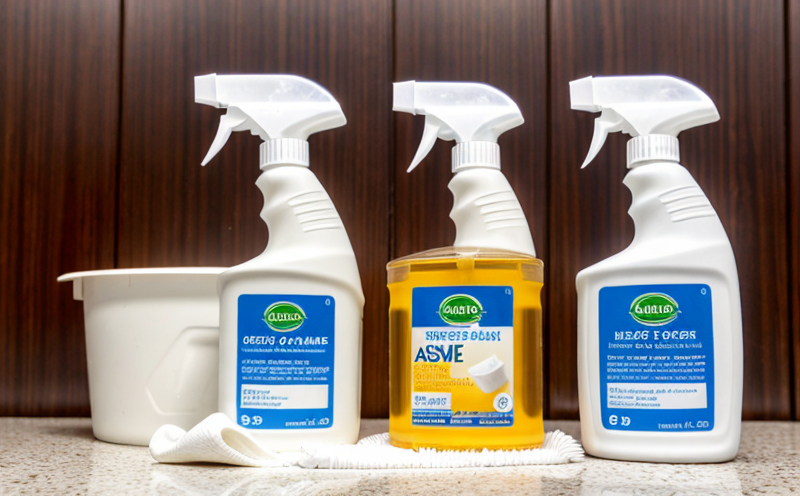EN 1650 Fungicidal Activity Testing of Cleaning Products
The European Standard EN 1650 specifies a method for determining the fungicidal activity of cleaning products. This standard is essential for manufacturers and quality assurance professionals aiming to ensure their products effectively control fungal growth, thereby enhancing hygiene and safety in residential and commercial environments.
Fungicides are commonly used in cleaning products to prevent mold and mildew from developing on surfaces such as floors, walls, and bathroom fixtures. The fungicidal activity test evaluates the efficacy of these fungicides by measuring their ability to inhibit fungal growth under specified conditions. Compliance with this standard is critical for product safety and effectiveness.
The testing protocol outlined in EN 1650 involves inoculating a controlled environment with various fungal species, exposing them to the cleaning product under defined parameters, and assessing the reduction in fungal colony-forming units (CFUs) over time. The results provide quantitative data on the fungicidal activity of the tested product.
Accurate testing is crucial for several reasons. First, it ensures that products meet regulatory requirements and industry standards. Second, it allows manufacturers to optimize their formulations for maximum efficacy while minimizing potential side effects or environmental impact. Finally, reliable test results build consumer trust and confidence in the product's performance.
The methodology described in EN 1650 is robust and reproducible, making it a preferred choice among laboratories specializing in hygiene testing. By adhering to this standard, manufacturers can ensure their products are safe for use by consumers while also contributing to healthier living spaces.
- Compliance with international standards
- Enhanced product safety and effectiveness
- Optimized formulation development
- Increased consumer trust and confidence
- Reproducible and reliable test results
- Regulatory compliance assurance
In summary, EN 1650 fungicidal activity testing is a vital component of the quality control process for cleaning products. It ensures that these products meet stringent hygiene standards while providing valuable data to guide formulation improvements.
Scope and Methodology
The scope of EN 1650 covers the determination of fungicidal activity in cleaning products intended for use in environments where fungal contamination is a concern. This includes residential, commercial, and industrial settings such as hospitals, schools, and food processing facilities.
The methodology involves several key steps:
- Selection of appropriate fungal strains
- Inoculation of the test cultures on agar plates
- Application of the cleaning product to the inoculated cultures
- Cultivation under specified conditions
- Quantification of fungal growth using CFU counts
- Evaluation of fungicidal activity based on reduction in CFUs
The test is conducted at controlled environmental conditions, typically room temperature and humidity levels within a specific range. The duration of the test varies depending on the fungal species used but generally spans several days to ensure accurate measurement.
For each test batch, multiple samples are prepared to account for variability in product consistency. This ensures that the results are statistically significant and representative of the entire production lot.
The acceptance criteria involve a minimum reduction in CFUs compared to control samples not exposed to the cleaning product. The specific threshold varies based on the fungal species tested but is typically set at 90% or higher.
Accurate record-keeping and documentation are essential throughout the testing process. This includes detailed notes on environmental conditions, test procedures, and results. These records help ensure traceability and facilitate any necessary reproducibility checks.
Why Choose This Test
- International Recognition: EN 1650 is widely recognized and accepted in Europe, ensuring broad applicability across multiple markets.
- Regulatory Compliance: Compliance with this standard helps manufacturers meet legal requirements set by various regulatory bodies.
- Enhanced Product Safety: Testing ensures that products are effective against harmful fungi without compromising safety for users.
- Predictable Results: The standardized methodology provides consistent and reliable data, allowing for better decision-making in product development.
- Consumer Confidence: Demonstrated effectiveness of fungicides boosts consumer trust in the brand's commitment to hygiene and health.
- Competitive Advantage: Offering products that meet or exceed this standard can differentiate a company from competitors.
- Purposeful Optimization: By identifying the most effective fungicidal concentrations, manufacturers can optimize their formulations for optimal performance.
- Eco-Friendly Formulations: Testing helps in selecting environmentally friendly options that still provide excellent fungicidal activity.
Use Cases and Application Examples
The EN 1650 fungicidal activity test is particularly useful for a wide range of cleaning products, including:
- Bathroom cleaners
- Floor polishes
- Dishwashing detergents
- Disinfectants used in healthcare settings
- Vacuum cleaner bags and filters
- Cleaning wipes for use in food processing facilities
In each of these applications, the test ensures that the fungicidal activity is sufficient to prevent fungal growth on surfaces where it can pose a risk. For example, in healthcare settings, ensuring effective fungicidal activity in cleaning products used around patients helps reduce the spread of infections.
The results from EN 1650 testing are also valuable for research and development teams working on new formulations or improvements to existing products. By understanding how different ingredients affect fungal growth inhibition, these teams can innovate more effective and safer products.





